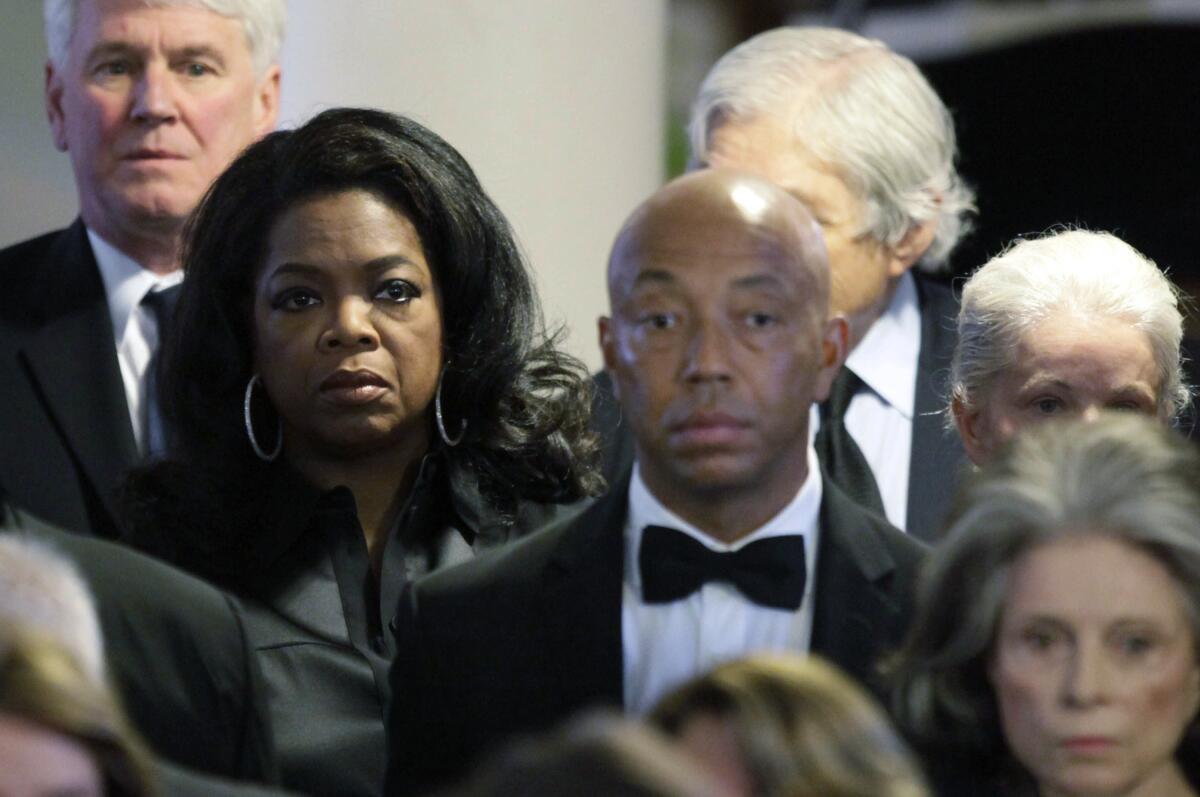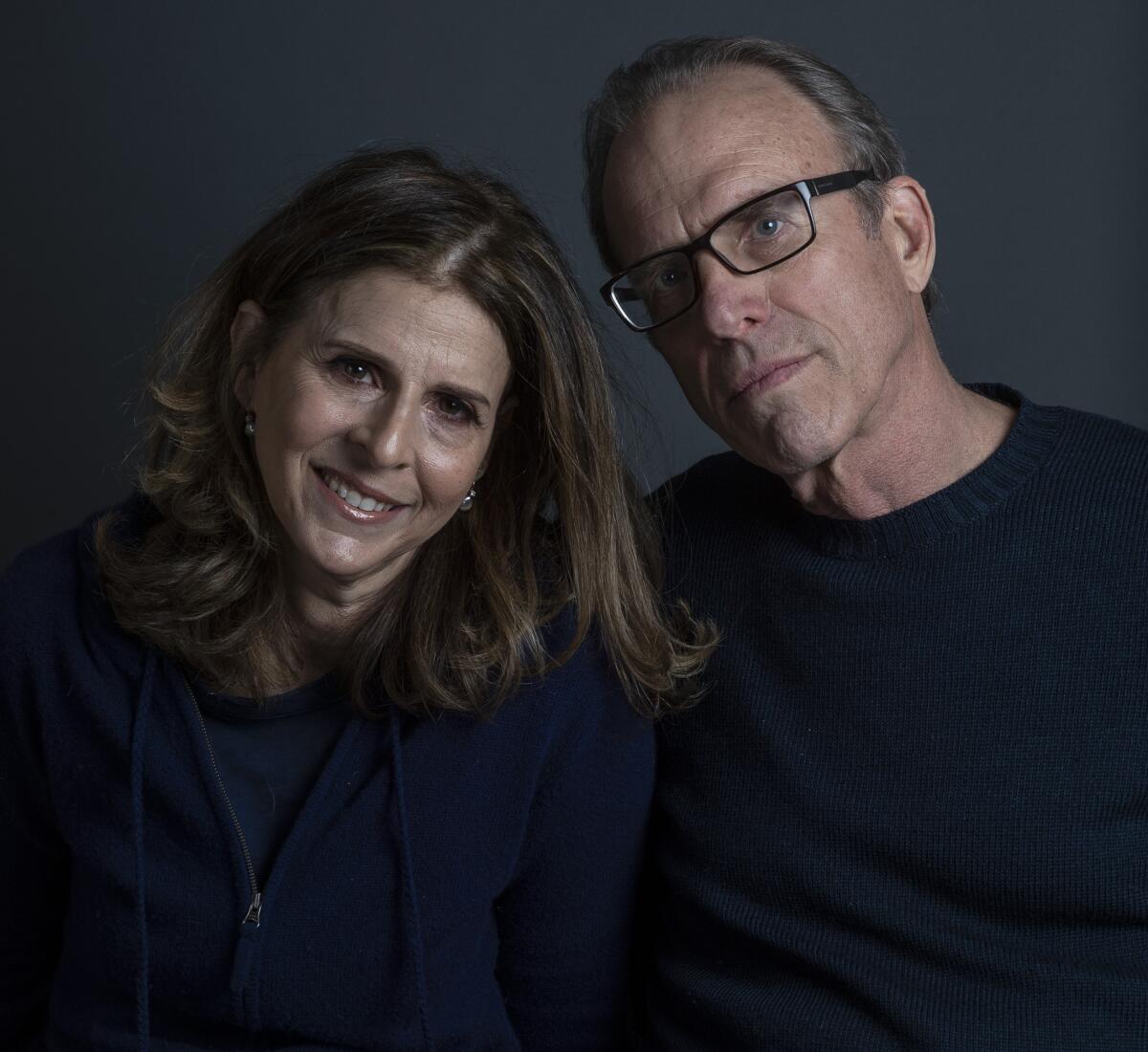A timeline of Oprah Winfrey’s involvement with the Russell Simmons documentary

- Share via
In December, Oprah Winfrey announced that she would serve as an executive producer for “On the Record,” an Apple documentary featuring some of the 20 women who have accused disgraced music mogul Russell Simmons of sexual harassment and assault, beginning with a November 2017 report in The Times.
A month later, she was out of the project, citing creative differences between herself and filmmakers Kirby Dick and Amy Ziering.
The sudden move sent waves through the industry and stunned the directors, who in a recent interview with The Times detailed the “horrible” fallout of Winfrey’s decision and provided some more context as to what went down behind the scenes.
Here’s a breakdown of Winfrey’s involvement — and eventual un-involvement — in the highly anticipated Sundance pick.
Apple partners with Winfrey
As part of Apple TV+’s first media presentation in March, the new streaming service announced a multiyear partnership with Winfrey, whom the tech company had tapped to work on two documentaries. One would be a multi-part look at mental health.
The other, then titled “Toxic Labor,” was billed as a timely look at workplace harassment.
“The Apple platform allowed me to do what I do in a new way,” Winfrey told those gathered at the Steve Jobs Theater on the Apple campus. “They’re a company that reimagined how we communicate … [they’re] in a billion pockets, y’all. That represents a major opportunity to make a genuine impact.”
But it wasn’t until winter that specific details about “Toxic Labor” — which would be renamed “On the Record” — emerged.
First subject of the doc is unveiled
In early December, it was announced that the documentary would premiere at the Sundance Film Festival in late January before landing on Apple TV+.
With the news came more information about the nature of the project.
The movie’s log line said it would follow “a brilliant former music executive who grapples with whether to go public with her story of assault and abuse by a notable figure in the music industry. The film is a profound examination of race, gender, class and intersectionality, and the toll assaults take on their victims and society at large.”
Sundance’s release also unveiled the name of the film’s primary subject: Drew Dixon.
In a 2017 bombshell interview with the New York Times, Dixon alleged that Simmons had raped her in his apartment in 1995. The Def Jam Recordings co-founder served as Dixon’s direct supervisor while she was an executive assistant at the label, and she quit Def Jam shortly after the alleged rape.
Winfrey was listed as an executive producer on the feature.
50 Cent and Simmons confront Winfrey
Shortly after the Sundance reveal, rapper 50 Cent targeted Winfrey on Instagram, accusing the TV host and super-producer of singling out black men, such as Simmons, in her #MeToo activism.
“I don’t understand why Oprah is going after black men,” the “Candy Shop” hitmaker wrote under a photo of Simmons and Winfrey smiling together. “No Harvey Weinstein, No Epstein, just Micheal jackson and Russell Simmons this … is sad.”
The next day, Simmons took to social media to air his grievances with the Harpo Productions head.
“Dearest OPRAH, you have been a shining light to my family and my community. Contributing so much to my life that I couldn’t list a fraction of it in this blog,” Simmons wrote, captioning a photo of himself and Winfrey having a book talk. “This is why it’s so troubling that you choose me to single out in your recent documentry.
“I have already admitted to being a playboy more (appropriately titled today ‘womanizer’) sleeping with and putting myself in more compromising situations than almost any man I know,” he continued. “So many that some could reinterpret or reimagine a different recollection of the same experiences.”
Winfrey did not respond to the social media criticisms.
Dick and Ziering get real notes

Though Simmons’ Instagram meltdown didn’t initially worry Dick and Ziering, the filmmaking duo later told The Times that they received their most critical notes yet from Winfrey’s production company just days after the music mogul posted his rant.
Up until that point, the directors explained, all interactions with Winfrey and Harpo had been positive and encouraging, leading to relatively insignificant requests, such as “We don’t like the way this scene transitions” or “Can we build out this scene because we want more of this character?”
The studio’s new concerns were different, suggesting that the film might not be ready for Sundance. Though surprised by the sudden pushback, the pair didn’t let it shake them.
“We felt like we could address them,” Dick said. “We didn’t really feel like the film needed them, because the film was already good, but as good partners, we wanted to honor the relationship and just keep moving forward.
“So what we had to do was cancel a lot of holiday plans, but we have a great staff and we pushed forward and we got it out.”
Winfrey and Apple exit the doc
On Jan. 10, Winfrey announced her departure from the project — just 20 minutes after she sent an email notifying Dick and Ziering of her plans. In her public statement, she cited creative differences while declaring her “respect” for the filmmakers she‘d left behind.
“In my opinion, there is more work to be done on the film to illuminate the full scope of what the victims endured and it has become clear that the filmmakers and I are not aligned in that creative vision,” Winfrey said.
“Kirby Dick and Amy Ziering are talented filmmakers. I have great respect for their mission but given the filmmakers’ desire to premiere the film at the Sundance Film Festival before I believe it is complete, I feel it’s best to step aside.”
She also noted that she “unequivocally” believes and supports Simmons’ accusers and clarified that she would continue to collaborate with Time’s Up to make sure the women’s stories are seen and heard.
“We support Oprah Winfrey in maintaining that the victims’ stories deserve to be heard on their own terms,” Time’s Up President Tina Tchen said in a statement.
“Too often, black women are silenced, disbelieved, or even vilified when they speak out. On top of that, for years, these women have been attacked by powerful forces surrounding Russell Simmons — illustrating how difficult it is to speak out against powerful men. And how important it is for powerful men to be held accountable for their actions.”
Apple also dropped its involvement, which had hinged on its deal with Winfrey.
The filmmakers respond
When Winfrey walked, Dick and Ziering released their own statement, expressing their disappointment while still giving her credit for standing by “the survivors in the film.”
“Revealing hard truths is never easy, and the women in our documentary are all showing extraordinary strength and courage by raising their voices to address sexual abuse in the music industry,” they said. “The film is a beacon of hope for voices that have long been suppressed, and an inspiration for anyone wanting to regain their personal power.”
In a follow-up interview, the directors told The Times they were blindsided by Winfrey’s move, describing their “close working relationship” with her throughout the making of the film.
“She loved, loved, loved what we did,” Ziering recalled. “And then she saw it numerous times throughout the editing process. We had a very close working relationship and very, very positive — enthusiastically positive. There weren’t any issues.”
Despite the setback, “On the Record” will still debut Jan. 25 at Sundance, where Dick and Ziering will be on the lookout for a new distributor.
Winfrey tells her side
In a New York Times piece published Friday, Winfrey elaborated on the reasoning behind her decision to pull out of the film, explaining the difficult balancing act she had been forced to perform. After hearing concerns from trusted external sources, Winfrey said, she ultimately felt the film needed more work and would not be ready in time for Sundance.
For those reasons, the industry veteran said, she dissociated herself from the vehicle — though she acknowledged that Simmons had pressured her “multiple times.” Winfrey maintained that she never stopped believing the women at any point.
“I told him directly in a phone call that I will not be pressured either into, or out of, backing this film,” Winfrey said. “I am only going to do what I believe to be the right thing.”
Winfrey said she also received calls from people who challenged Dixon’s account, as well as from “When They See Us” creator Ava DuVernay, who reportedly offered a harsh critique of the film after Winfrey asked her to view it through a cultural lens.
“She’s got Simmons on one side pressuring her, and then she’s got a film on the other side that she doesn’t agree with,” DuVernay told the New York Times. “So if she walks away from the film she seems like she’s caving to Simmons, and if she stays with the film then she’s putting her name on something that she feels doesn’t quite hit the mark.”
Dixon told the New York Times she felt abandoned when she and other participants heard Winfrey was backing out.
“I feel like I’m experiencing a second crime,” Dixon said. “I am being silenced. The broader community is being intimidated. The most powerful black woman in the world is being intimidated.”
More to Read
Only good movies
Get the Indie Focus newsletter, Mark Olsen's weekly guide to the world of cinema.
You may occasionally receive promotional content from the Los Angeles Times.











